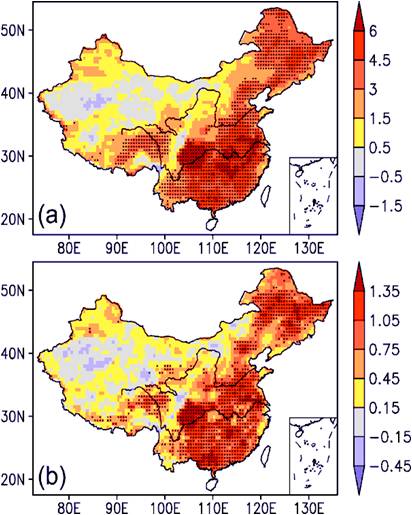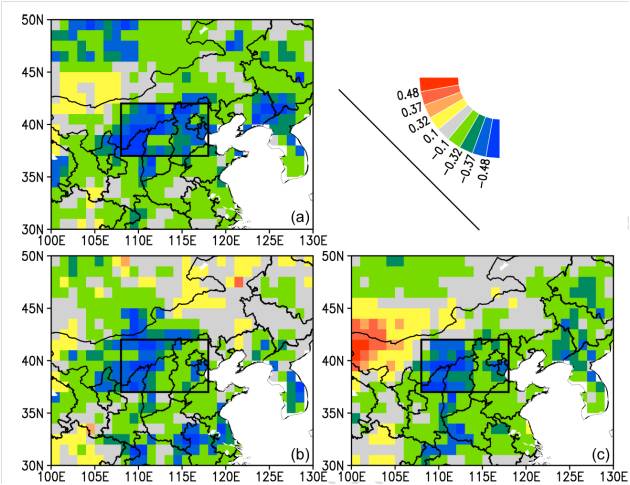Spring Soil Moisture Conditions Offer the Potential for Improving the Prediction of Summer Hot-weather Extremes in China
Date:2015-07-22
Hot-weather extremes are one of the most dangerous natural hazards in China, like in many other regions of the globe. However, their prediction one season ahead remains a scientific challenge. Soil moisture anomalies can persist for several months or more, and thus may offer the potential for improving seasonal climate prediction.
Prof. ZHANG Jingyong and Dr. WU Lingyun from the Institute of Atmospheric Physics, Chinese Academy of Sciences previously demonstrated that soil moisture feedback significantly influences the occurrence of hot days and heat waves in areas outside the arid and semi-arid regions of China. Their latest study focuses on North China, in which the relationship between spring soil moisture and summer hot-weather extremes is investigated. They found that the spring soil moisture condition is closely linked to the occurrence of summer hot days and heat waves in North China. Specifically, greater soil moisture in spring inhibits the occurrence of hot days in summer, and vice versa. Mechanistically, spring soil moisture anomalies can persist into the summer season, subsequently altering latent and sensible heat fluxes and thus significantly affecting summer hot-weather extremes. Spring soil moisture could therefore be used to predict hot days and heat waves over North China in summer.

Fig. 1. Regions of strong soil moisture feedback to summer (a) hot days and (b) heat waves in China (identified by long-term Weather Research and Forecasting model simulations).

Fig. 2. Correlation between summer heat waves averaged over North China (enclosed by the box) and spring soil moisture.
Soil moisture not only affects summer hot-weather extremes over many areas of China, but also plays an important role in influencing droughts and floods. Aside from soil moisture, other land surface factors such as soil temperature and vegetation are also of importance for summer climate extremes in China. A series of studies by Zhang and Wu suggest that the seasonal prediction of summer climate extremes in China could be improved if land surface conditions are taken into consideration.
References
Wu, L., and J. Zhang, 2015: The relationship between spring soil moisture and summer hot extremes over North China. Adv. Atmos. Sci., doi: 10.1007/s00376-015-5003-0.
Zhang, J., and L. Wu, 2014: Impact of land–atmosphere interactions on climate over East Asia, China Meteorological Press, Beijing, 1–138.
Zhang, J., and L. Wu, 2011: Land–atmosphere coupling amplifies hot extremes over China. Chinese Sci. Bull., 31, 3328–3332.
Contact: WU Lingyun, wuly@lasg.iap.ac.cn
